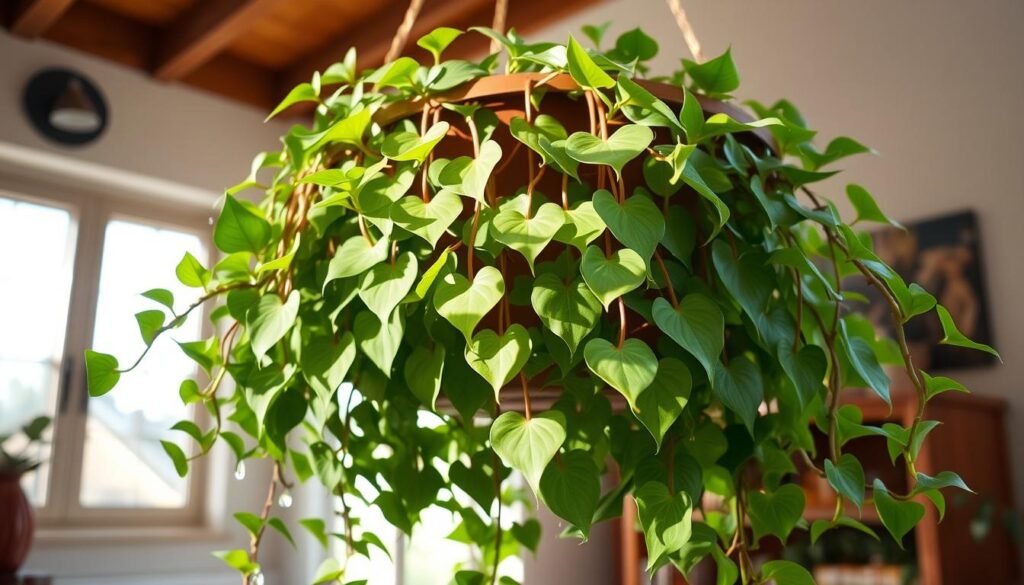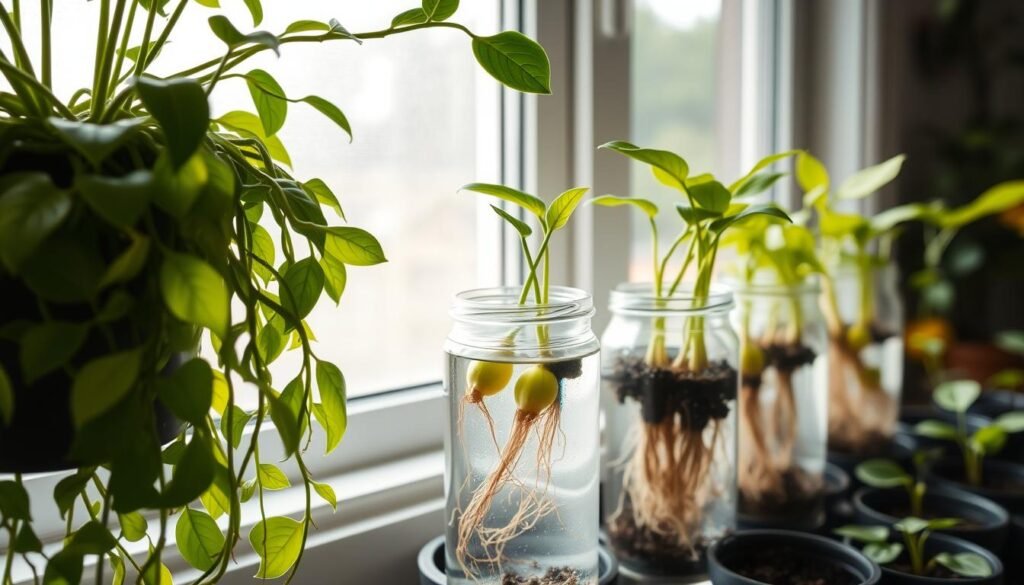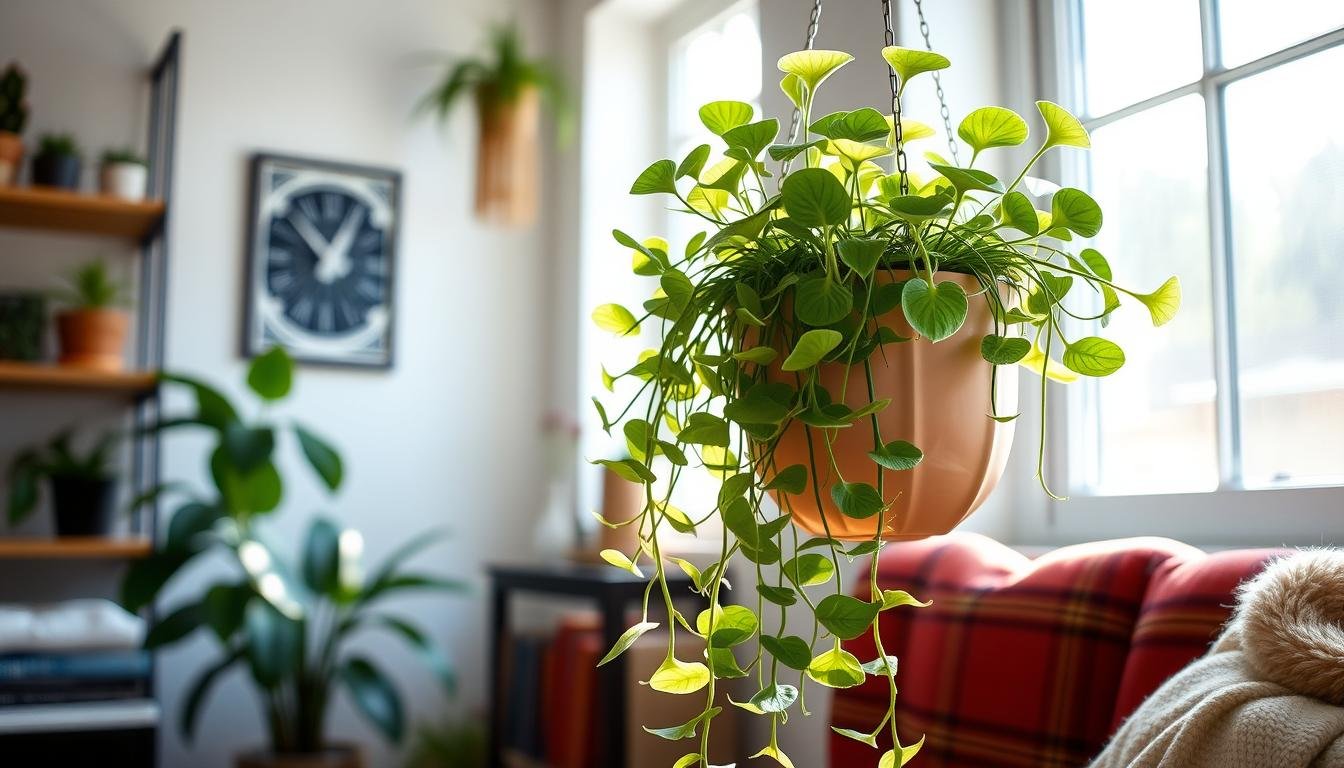I’ve always loved the whimsical charm of the String of Dolphins (Senecio peregrinus). Its delicate vines and dolphin-shaped leaves have made my home a serene oasis. If you want to grow this beauty in your home, this guide is for you.
Watching your String of Dolphins thrive is incredibly joyful. Its green leaves seem to dance across the room. This plant brings a touch of the tropics to your space and lifts your spirits. Let’s learn how to care for it and make your indoor oasis flourish.
Table of Contents
Understanding String of Dolphins: A Unique Succulent Hybrid
The string of dolphins plant is a standout in the world of exotic houseplants. It’s a mix of the String of Pearls and the Candle Plant. Its name, Senecio peregrinus or x Bacurio delfinatifolius, shows its special features.
Origin and Botanical Classification
This plant comes from the Asteraceae family, which includes many flowering plants. It grows well in Africa’s warm, dry areas. Its leaves can store water, helping it survive without much water.
Physical Characteristics
The string of dolphins has stems that look like strings with dolphin-like leaves. These leaves make it stand out. It also has small, white flowers that look like pompoms, adding to its beauty.
Natural Habitat
In the wild, it loves full sun to partial shade. Africa’s warm weather and low rain are perfect for it. It can grow in many soils, making it great for indoors and outdoors.
The string of dolphins plant is a favorite among succulent lovers. It’s easy to care for and can grow in different conditions. It’s perfect for both new and experienced plant owners.
Ideal Growing Conditions for String of Dolphins
The string of dolphins is a unique succulent that loves bright, indirect light indoors. It needs soil that drains well and should be watered only when dry. The best temperature for it is between 70°F and 80°F (21°C – 27°C). It can even handle temperatures as low as 40°F (4°C).
Keeping the humidity low, below 50%, is important for its health. This succulent doesn’t need to be repotted often. Keeping it slightly root-bound helps it bloom more.
- Blooms during the spring season
- Flower color is white
- Slow growth rate
- Hardy in USDA zones 9, 10, and 11
- Mature size can reach 3 feet long and 6 inches tall
The string of dolphins loves full sun to partial shade. Placing it in bright, indirect light keeps its green color and encourages growth.
“The String of Dolphins can grow impressive lengths of 2 to 3 feet, creating a lush, green waterfall effect.”
Watering this succulent is easy. Use the “soak and dry” method. Water it once a week in spring and summer. In winter, water it once or twice a month.
Creating the right environment is crucial for the string of dolphins to thrive. Manage light, temperature, humidity, and watering well. This will help your succulent look its best.
Light Requirements and Placement
The string of dolphins plant loves lots of light. It needs at least six hours of bright, indirect sunlight every day. A south-facing window is perfect for indoor growth, offering the right amount of light.
While it can handle medium light, more light keeps it looking its best. This prevents it from becoming leggy and losing its color.
Indoor Light Exposure
For indoor growth, place your string of dolphins near a south-facing window. This spot gives it six hours of sunlight, ideal for its needs. But, avoid direct sunlight to prevent leaf damage.
Outdoor Light Management
Outdoor growth requires careful sunlight management. While it loves full sun, too much can scorch its leaves. Instead, choose partial shade or filtered light to keep it healthy and bright.
Using Grow Lights
Grow lights are a great solution when natural light is lacking. Fluorescent and LED grow lights work well, offering the right spectrum and intensity. Aim for a color temperature of 5000 to 6500K for best results.
Provide 12 to 14 hours of light and then a dark period. This helps your plant stay in sync with its natural rhythm.
“Proper light exposure is essential for the health and vibrant appearance of your string of dolphins plant. By understanding its light needs and providing the right conditions, you can ensure your succulent thrives indoors and out.”
Soil and Potting Requirements
For a thriving String of Dolphins, the right soil and potting setup are key. These succulents love well-draining, dry soil that feels like their natural home. A mix of 2 parts potting soil, 1 part pumice or perlite, and 1 part sand works great.
The pot needs holes to drain water and avoid root rot. You can use plastic or terra-cotta pots. Terra-cotta is popular because it helps keep the soil just right.
Refreshing the soil every year or two is vital. It keeps the soil from getting too old and hard. Use a fresh, draining succulent potting mix when you repot your string of dolphins soil.
| Soil Component | Recommended Ratio |
|---|---|
| Potting Soil | 3 parts |
| Perlite or Sand | 1 part |
| Organic Matter (compost, peat moss) | 1 part |
With the right soil and potting, your String of Dolphins will thrive. Enjoy its beautiful, cascading growth for many years.
Watering Techniques and Schedule
Watering your string of dolphins succulent is key. Use the “soak and dry” method. Let the soil dry out fully, then soak it until water drains from the pot. This keeps the roots moist without being soggy.
Seasons change, so does your watering schedule. In spring and summer, water every two to three weeks. But in fall and winter, when it’s dormant, water once a month or less. Too much water can cause root rot, so watch the soil’s moisture.
Try bottom watering for a different approach. Place the pot in a shallow water tray. Let the soil soak up moisture from the bottom. This method avoids splashing water on the leaves and stems.
Temperature and Humidity Management
The string of dolphins, a unique succulent, needs specific care for growth. It likes temperatures between 70°F and 80°F (21°C to 27°C). It can handle cooler temperatures down to 40°F (4°C).
This succulent does well in dry air, preferring humidity below 50%. It doesn’t need misting or high humidity to thrive. This makes it perfect for homes with average humidity.
Protect the string of dolphins from frost and freezing. These can harm its leaves and appearance. Keep the temperature steady and avoid sudden changes for the plant’s health.
| Characteristic | Preferred Range | Tolerance Level |
|---|---|---|
| string of dolphins temperature | 70°F – 80°F (21°C – 27°C) | Down to 40°F (4°C) |
| succulent humidity | Below 50% | Average household humidity |
By keeping the right string of dolphins temperature and succulent humidity, your plant will stay healthy and look great.

“Maintaining the proper temperature and humidity levels is crucial for the string of dolphins’ optimal growth and appearance.”
Fertilizing and Feeding Guidelines
Caring for your string of dolphins plant is easy. You don’t need to fertilize it often. Too much fertilizer can harm the plant and make its leaves lose shape. Feed your succulent lightly once a month when it’s growing.
Types of Fertilizers
Choose organic fertilizers for your string of dolphins. They are better for the plant. Good options include:
- Worm compost
- Liquid kelp
- Fish emulsion
These fertilizers give your succulent fertilizer the nutrients it needs without harming it.
Feeding Schedule
Timing is key when fertilizing your string of dolphins. Feed it lightly in early spring to help it grow and bloom. A monthly feeding is enough during the growing season. Don’t fertilize in winter when the plant is sleeping.
By following these fertilizing tips, your string of dolphins will stay healthy and beautiful. It will keep its unique, flowing look.
Pruning and Maintenance Tips
To keep your string of dolphins looking lush and cascading, you need to prune and care for it seasonally. Follow these easy tips to keep your succulent plant healthy and looking great indoors.
Prune Biannually for Optimal Growth
Prune your string of dolphins biannually, in spring and summer. This helps it grow bushier and keep its trailing shape. Use sharp, clean scissors or pruning shears to cut off yellowing or diseased parts.
Don’t prune too much in winter when the plant is dormant. Just remove dead or damaged leaves to avoid stressing it.
Promote Healthy Regrowth
After pruning, add a thin layer of compost or succulent fertilizer to the soil. This gives the plant the nutrients it needs for new growth. But don’t over-prune, as it can weaken the plant.
Let the soil dry a bit before watering again. This helps the plant heal and grow stronger.
Maintain Cleanliness and Safety
Always use clean, sharp tools for pruning. Sterilize them before and after to stop diseases or pests. Wear gloves and protective clothes when handling the plant, as its sap can irritate your skin.
With the right pruning and care, your string of dolphins will flourish. It will add natural beauty to your home.
Propagation Methods and Success Rates
Propagating your String of Dolphins plant is rewarding. It lets you grow more of these beautiful, trailing succulents. You can use stem cuttings or water propagation to get high success rates.
Stem Cutting Technique
Stem cuttings are a popular way to propagate String of Dolphins. Choose a healthy stem and cut it 5 inches long, with 2-3 nodes. Remove the lower leaves and plant it in moist, well-draining soil.
With proper care, roots will grow in a couple of weeks. This starts your new plant’s growth.
Water vs. Soil Propagation
You can also propagate String of Dolphins in water. Place the stem cutting in a clear container with fresh water. Make sure the nodes are covered.
Change the water every few days and keep it in bright, indirect light. Roots will appear in a couple of weeks. Then, move the cutting to a potting mix.
Both soil and water methods work well for String of Dolphins. Try both to see which one you prefer. With patience and care, you can grow your own String of Dolphins at home.

Common Pests and Disease Prevention
The String of Dolphins succulent is a unique hybrid that faces common pests and diseases. Keeping a close eye on your plant and taking action early is crucial. This way, you can keep your String of Dolphins healthy and looking great.
Aphids are a big problem for these plants. They suck the sap, causing leaves to turn yellow and grow poorly. Mealybugs and scale insects also like to live on these plants, leaving white or brown marks. Spider mites create webs and can be a bother too.
String of Dolphins can also get sick with fungal diseases like root rot, botrytis, and southern blight. These diseases love damp soil and poor air. They cause black spots and damage to the leaves.
To fight off these issues, follow these tips:
- Don’t overwater to avoid fungal diseases.
- Make sure the plant has good air flow to keep pests and fungi away.
- Use clean soil and potting mix to prevent root rot.
- Check your plant often for pests or diseases like yellow leaves or webs.
- Quickly treat any pests with alcohol, neem oil, or insecticidal soap.
- If you see a fungus, use a fungicide but follow the instructions carefully.
By being careful and using these tips, your String of Dolphins will stay healthy and beautiful.
| Pest or Disease | Symptoms | Prevention and Treatment |
|---|---|---|
| Aphids | Discoloration, stunted growth | Inspect regularly, use insecticidal soap or neem oil |
| Mealybugs and Scale Insects | White patches, brown spots on leaves | Wipe leaves with alcohol-soaked cotton swabs, use neem oil |
| Spider Mites | Fine webbing, leaf discoloration | Increase humidity, use insecticidal soap or neem oil |
| Root Rot | Black spots, wilting, mushy roots | Avoid overwatering, use well-draining soil, consider fungicide |
| Botrytis (Grey Mold) | Grey fuzzy growth, leaf decay | Improve air circulation, use fungicide if necessary |
| Southern Blight | Wilting, stem and root rot | Ensure good drainage, consider fungicide treatment |
Seasonal Care and Blooming Patterns
The String of Dolphins is a unique succulent that’s a joy to grow. These plants bloom in spring and early summer. They show off small, white flowers with a cinnamon scent in clusters.
They bloom more when they’re a bit root-bound. This shows how adaptable they are.
As seasons change, so does the care for String of Dolphins. In fall and winter, water them less. This helps them stay healthy during their dormant phase.
In summer, move them to a covered spot. This ensures they get enough string of dolphins flowers and light for growth.
| Bloom Season | Flower Color | Growth Rate | Hardiness Zone | Mature Size | Plant Type | Sun Exposure | Watering Needs |
|---|---|---|---|---|---|---|---|
| Spring – Summer | White | Slow | 10 – 11 | 6 in. tall | Perennial succulent | Full sun – Partial shade | Low |
With proper seasonal succulent care, your String of Dolphins will flourish. They’ll reward you with beautiful blooms and lush foliage.
“The String of Dolphins is a true delight, with its small, white, cinnamon-scented flowers that bloom in the spring and early summer months.”
Conclusion
The string of dolphins is a unique, low-maintenance succulent that thrives indoors. It needs the right light, soil, and watering to bloom. Regular pruning and pest control keep it healthy and beautiful.
This succulent requires specific growing conditions but is worth it. With the right string of dolphins care tips, you can grow it successfully. It adds natural charm to your indoor succulent growing space.
Whether you’re new to plants or a seasoned enthusiast, the string of dolphins is rewarding. This guide helps you care for it, bringing natural wonder to your space.
FAQ
What is a string of dolphins plant?
The string of dolphins plant, or Senecio peregrinus, is a unique succulent. Its leaves look like small dolphins jumping. It’s a favorite houseplant, often seen in hanging pots.
What are the key features of a string of dolphins plant?
This plant is a mix of String of Pearls and Candle Plant. It has stems that look like strings and leaves that resemble dolphins. It’s from Africa and belongs to the Asteraceae family.
What are the ideal growing conditions for a string of dolphins plant?
It loves bright, indirect light and well-draining soil. Water it less often. Keep it in a spot with temperatures between 70°F and 80°F (21°C – 27°C) and humidity below 50%.
How much light does a string of dolphins plant need?
It needs at least six hours of bright, indirect sunlight daily. A south-facing window is perfect for indoor plants. Outdoor plants should avoid direct sunlight to prevent leaf damage.
What type of soil does a string of dolphins plant prefer?
Use soil that drains well, like a cactus/succulent mix. Or mix 2 parts potting soil, 1 part pumice or perlite, and 1 part sand.
How often should a string of dolphins plant be watered?
Water it when the soil is dry, then let it dry out again. Water until it drains from the pot. Water less in fall and winter when it’s dormant.
What are the temperature and humidity requirements for a string of dolphins plant?
It likes temperatures between 70°F and 80°F (21°C – 27°C). It can handle cooler temperatures but prefers low humidity, below 50%.
How should a string of dolphins plant be fertilized?
It doesn’t need much fertilizer. Feed it lightly once a month during growing season. Use organic fertilizers like worm compost or fish emulsion.
How can a string of dolphins plant be propagated?
Propagate it with stem cuttings. Cut 5-inch pieces with 2-3 nodes, remove leaves, and plant in moist mix or water. Both methods work well.
What common pests and diseases affect a string of dolphins plant?
It can get pests like aphids and mites, and diseases like root rot. Keep it healthy with good care and prevention.
Source Links
- How to Grow and Care for String of Dolphins – https://www.thespruce.com/growing-string-of-dolphins-5089406
- How to Grow and Care for String of Dolphins – https://www.trimmedroots.com/string-of-dolphins-growing-guide/
- Propagating Your String Of Dolphins: Step-by-step Guide 🐬 – https://greg.app/propagate-string-of-dolphins/
- Dolphin Plant – https://www.shrubhub.com/Shop-Plants/Others/Dolphin-Plant/15220?srsltid=AfmBOortj5kDf2I4mFFz0ECisSfLo4GErahL8ir4UadmwylpCGT90etl
- String of Dolphins ‘Care and Growing Guide’ – Everything You Need to Know! – https://planetdesert.com/blogs/news/string-of-dolphins-plant-senecio-peregrinus-care-growing-guide?srsltid=AfmBOoqbj9aftqVli3Q44tNlW1YlTRp-nZtIcBmbNHA4v2rRMGjF-bVY
- String of Dolphins ‘Senecio peregrinus’ – https://planetdesert.com/products/string-of-dolphins-senecio-peregrinus?srsltid=AfmBOopjMDFrsQsCqH2zvalisnBLxgBg1FtO791fZ7IdF0KUNmdCnHYL
- String of Dolphins ‘Care and Growing Guide’ – Everything You Need to Know! – https://planetdesert.com/blogs/news/string-of-dolphins-plant-senecio-peregrinus-care-growing-guide?srsltid=AfmBOoq9xSSuTm0tVqQ9lK27yOEm4SNa7D0yRl6L_f9nBayjLxACsKf6
- The Enchanting String of Dolphins: A Complete Care Guide for Your Unique Succulent – Mitchell’s Nursery & Greenhouse – https://mitchellsnursery.com/the-enchanting-string-of-dolphins-a-complete-care-guide-for-your-unique-succulent/?srsltid=AfmBOop2rfKlsyR1SYVVicnePdoZhjkIMO7eYztCHl7-SVufJO1-K8k0
- 🐬 My String of Dolphins’s Light Needs – https://greg.app/string-of-dolphins-light-requirements/
- String of Dolphins ‘Care and Growing Guide’ – Everything You Need to Know! – https://planetdesert.com/blogs/news/string-of-dolphins-plant-senecio-peregrinus-care-growing-guide?srsltid=AfmBOoq-e97bHSuDAZMFwaQW48DCpJ1927n88ee0hEAnci44gLX65J2k
- String of Dolphins ‘Care and Growing Guide’ – Everything You Need to Know! – https://planetdesert.com/blogs/news/string-of-dolphins-plant-senecio-peregrinus-care-growing-guide?srsltid=AfmBOop4K5xw24koHoTj1GN5Y1VVSCherR4PxucEgSveEY8ZK0K6S7yU
- 🐬 Soil Recommendations for String of Dolphins – https://greg.app/string-of-dolphins-soil/
- String of Dolphins ‘Care and Growing Guide’ – Everything You Need to Know! – https://planetdesert.com/blogs/news/string-of-dolphins-plant-senecio-peregrinus-care-growing-guide?srsltid=AfmBOoopIUT9STI1bcb_8vqj2UnjJibcbkF3Kd9rpLNdUSuBZmNvhtGH
- The Enchanting String of Dolphins: A Complete Care Guide for Your Unique Succulent – Mitchell’s Nursery & Greenhouse – https://mitchellsnursery.com/the-enchanting-string-of-dolphins-a-complete-care-guide-for-your-unique-succulent/?srsltid=AfmBOoonLAyDTtmJluDn6tlM1vhy3IXN42Jcq5rWaAOTlADJB5jsenxA
- String of Dolphins Care Guide — Fiddle and Clay – https://www.fiddleandclay.com/plant-care-guides/string-of-dolphins-care-guide
- The Green Gargoyle – https://thegreengargoyle.org/strings-of-things
- All About Flowering Succulents ‘Types, Care and Growing Tips’ Everything You Need To Know ! – https://planetdesert.com/blogs/news/flowering-succulents-types-care-growing-guide?srsltid=AfmBOoo4BcvtTueQMN2kW00cEOLWMIMHwt36q1f4WGcW2VH2zuI0APms
- String of Dolphins ‘Care and Growing Guide’ – Everything You Need to Know! – https://planetdesert.com/blogs/news/string-of-dolphins-plant-senecio-peregrinus-care-growing-guide?srsltid=AfmBOorNen1b8GZp28bqCHePmpHBb9ESNOrHQMnpDdX6wO6xLVG2ONqG
- The Enchanting String of Dolphins: A Complete Care Guide for Your Unique Succulent – Mitchell’s Nursery & Greenhouse – https://mitchellsnursery.com/the-enchanting-string-of-dolphins-a-complete-care-guide-for-your-unique-succulent/?srsltid=AfmBOopKsoNxuVBNf425-VbY4ci89YatHWM9_q1DkVYxcNR9iHaI01Ln
- How To Prune String Of Dolphins 🐬 – https://greg.app/how-to-prune-string-of-dolphins/
- String of Dolphins ‘Care and Growing Guide’ – Everything You Need to Know! – https://planetdesert.com/blogs/news/string-of-dolphins-plant-senecio-peregrinus-care-growing-guide?srsltid=AfmBOor2tAseUrDX1XFaIMf-7WZBuUxUjsNfnfDeArcSqe-6xhjrKKmz
- String of Dolphins Plant Care Guide – Living House – https://www.livinghouse.ca/news/title/string-of-dolphins-plant-care-guide/
- How to Grow the String of Dolphins Plant – https://essentialhouseplants.com/string-of-dolphins/
- Dolphin Plant – https://www.shrubhub.com/Shop-Plants/Others/Dolphin-Plant/15220?srsltid=AfmBOopd1heTqHEL99x-0hC7QASJukbrv99YTtO4Pgr2TUj6vBDnOeC3
- String of Hearts ‘Care & Growing Guide’ – Everything You Need to Know! – https://planetdesert.com/blogs/news/string-of-hearts-plant-care-growing-guide-types-ceropegia-woodii?srsltid=AfmBOooZ4bmJ0sZli7mMnvhszMCZW5E8dOdtu3n3v-adLZHZXi5MQEbR
- String of Dolphins ‘Care and Growing Guide’ – Everything You Need to Know! – https://planetdesert.com/blogs/news/string-of-dolphins-plant-senecio-peregrinus-care-growing-guide?srsltid=AfmBOorU2Dff2JXrhzpenkjZ4oO9fXzjeP0V31NxfIOyjj3PNFICCLPw
- Why Are There Black Spots On My String Of Dolphins Leaves? 🐬 – https://greg.app/black-spots-on-string-of-dolphins-leaves/
- String of Dolphins ‘Care and Growing Guide’ – Everything You Need to Know! – https://planetdesert.com/blogs/news/string-of-dolphins-plant-senecio-peregrinus-care-growing-guide?srsltid=AfmBOorvUrL5uaO47_xqGH36AZ9atF8cPKu1jSJWxuz5hvtHxnzn3Yza
- String of Dolphins ‘Senecio peregrinus’ – https://planetdesert.com/products/string-of-dolphins-senecio-peregrinus?srsltid=AfmBOoqkFZ01WU2Dwq0rI_JimcN02LEMXQCAGUKIncKcmNoyJYZBuewB
- Dolphin Plant – https://www.shrubhub.com/Shop-Plants/Others/Dolphin-Plant/15220?srsltid=AfmBOopHdRFFfqmGSN8_03C_zTaeS9OWIkGPY7iMBjeI-ymVlZyOkY75
- Senecio String of Dolphins – https://shop.armstronggarden.com/products/senecio-per-string-dolphins?srsltid=AfmBOorCbjg46cNCfeme-89hZI5eTn_fsKzEL423kBC0WxTFsVTI-hwC
- Keep Your Succulents Alive: How to Care for Succulents Ultimate Guide – https://planetdesert.com/blogs/news/keep-your-succulents-alive?srsltid=AfmBOordtHNgIDSW07YhHOh_0ijnhx4ocx1Yfxwx0l7CW_CG-S6q6vmC




